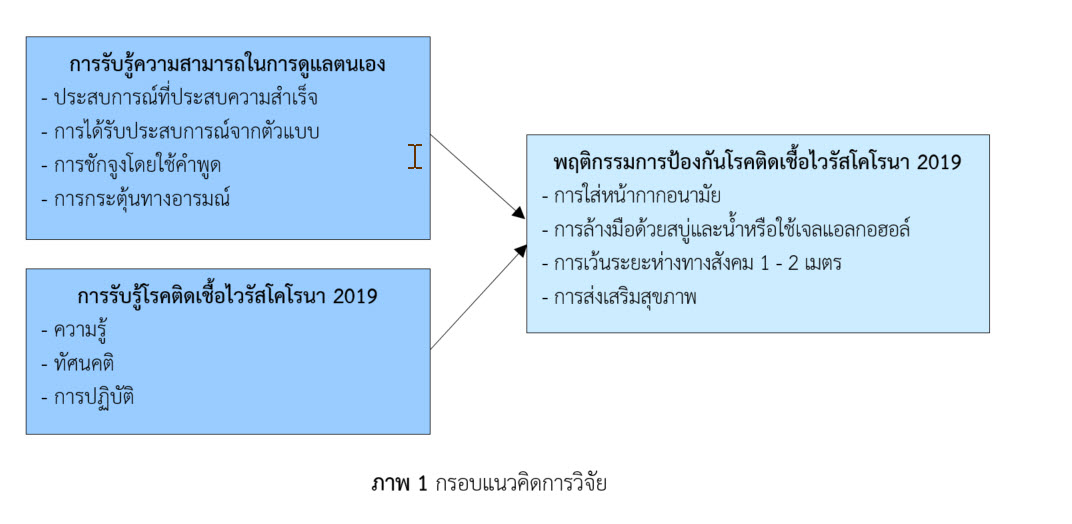การรับรู้ความสามารถในการดูแลตนเองกับพฤติกรรมการป้องกันโรคติดเชื้อไวรัสโคโรนา 2019 (โควิด-19) ของผู้สูงอายุ อำเภออู่ทอง จังหวัดสุพรรณบุรี
คำสำคัญ:
การรับรู้ความสามารถของตนเอง, ผู้สูงอายุ, พฤติกรรมการป้องกันโรค, โรคติดเชื้อไวรัสโคโรนา 2019บทคัดย่อ
การวิจัยเชิงพรรณนาแบบภาคตัดขวางนี้ มีวัตถุประสงค์เพื่อศึกษาความสัมพันธ์ของการรับรู้ความสามารถในการดูแลตนเองกับพฤติกรรมป้องกันโรคติดเชื้อไวรัสโคโรนา 2019 ของผู้สูงอายุ อำเภออู่ทอง จังหวัดสุพรรณบุรี กลุ่มตัวอย่างคือผู้สูงอายุที่เข้าร่วมโครงการด้วยความสมัครใจ โดยวิธีการสุ่มอย่างง่าย จำนวน 392 คน เครื่องมือที่ใช้คือแบบสอบถามโดยประยุกต์ทฤษฎีความสามารถแห่งตนของแบนดูรา ได้ค่าดัชนีความเที่ยงตรงเชิงเนื้อหา (S-CVI) เท่ากับ .933 และได้ค่าความเที่ยงตรงแบบสอบถามทั้งฉบับโดยใช้ค่าสัมประสิทธิ์อัลฟาของครอนบาค เท่ากับ .978 วิเคราะห์ข้อมูลโดยใช้สถิติเชิงพรรณนาและสถิติสหสัมพันธ์ของเพียร์สัน
ผลการวิจัยพบว่า ผู้สูงอายุมีการรับรู้ความสามารถในการดูแลตนเองโดยรวมอยู่ในระดับมาก (M = 3.95, SD = 0.71) การรับรู้โรคโควิด-19 โดยรวมอยู่ในระดับมาก (M = 4.10, SD = 0.77) พฤติกรรมการป้องกันโรคโควิด-19 โดยรวมอยู่ในระดับมาก (M = 4.15, SD = 0.69) และปัจจัยการรับรู้ความสามารถในการดูแลตนเองโดยรวมมีความสัมพันธ์ทางบวกอยู่ในระดับสูงกับพฤติกรรมการป้องกันโรคโควิด-19 (r = 0.74) อย่างมีนัยสำคัญทางสถิติที่ระดับ <.001
ดังนั้น ควรส่งเสริมกิจกรรมเกี่ยวกับการรับรู้ความสามารถในการดูแลตนเอง เพื่อให้ผู้สูงอายุมั่นใจและเชื่อมั่นในตนเองเพิ่มขึ้น อันนำไปสู่การปฏิบัติพฤติกรรมการป้องกันโรคที่ถูกต้องและเหมาะสมยิ่งขึ้น
เอกสารอ้างอิง
Bandura, A. (1997). Self-Efficacy: The Exercise of Control. New York: W.H. Freeman and Company.
Best, J. W. (1981). Research in Education. (3rd ed.). Englewood Cliffs, New Jersey: Prentice. Hall Inc.
Black, K. (2010). Business Statistics for Contemporary Decision Making. (6th ed.). USA: Wiley.
Bloom, B. S. (1964). Taxonomy of Education Objective: The Classification of Educational Goals: Handbook II: Affective Domain. New York: David Mckay.
Buasom, P., Promsiripaiboon, Y., & Sonkasetrin, A. (2019). Effects of Self-Efficacy Program on Health Behavior Modification in Elderly of High Blood Pressure Risk Group in Rommanee Sub-District, Kapong District, Phangnga Province. Journal of the Community Health Development Quarterly Khon Kaen University, 5(4), 549-567. (in Thai)
Bunthan, W., Whaikit, P., Soysang, V., Soynahk, C., Akaratanapol, P., & Kompayak, J. (2020). Factor Influencing to Health Promotion Behavior for Coronavirus Disease 2019 (COVID-19) Prevention of Older Adults. Journal of The Police Nurses, 12(2), 323-337. (in Thai)
Chatterjee, P., Nagi, N., Agarwal, A., Das, B., Banerjee, S., Sarkar, S., et al. (2020). The 2019 Novel Coronavirus Disease (COVID-19) Pandemic: A Review of the Current Evidence. Indian J Med Res, 151, 147-159.
Department of Disease Control. (2020). Coronavirus Disease 2019 (COVID-19) WHO Thailand Situation Report -21 February 2020. Retrieved April 7, 2020 from https://ncmc.moph.go.th/home/index.php/index/detail/29762.
Devalersakul, N., Siriwarakoon, W., & Roadyim, C. (2016). The Development of the Elderly as a Burden to Power: Case Study of Rangsit City Municipality. Veridian E-Journal Silpakorn University. (Humanities, Social Sciences and Arts), 9(1), 529-545. (in Thai)
Duangchinda, A., Sritarapipat, P., Injeen, J., & Manfak P. (2019). Factors Related to the Activities of Daily Living and Quality of Life among Thai Elderly in Chai Nat Province. Journal of Health and Nursing Research, 35(3), 60-73. (in Thai)
Glomjai, T., Kaewjiboon, J., & Chachvarat, T. (2020). Knowledge and Behavior of People Regarding Self-Care Prevention from Novel Coronavirus 2019 (COVID-19). Journal of Nursing, Public Health, and Education, 21(2), 29-39. (in Thai)
Jampathet, N., Chaem C, L., & Faimuemvai, P. (2018). The Nurse’s Role for Apply Self-Efficacy Theory in the Elderly Diabetic. HCU. Journal, 21(42), 153-164. (in Thai)
Krejcie, R. V., & Morgan, D. W. (1970). Determining Sample Size for Research Activities. Educational and Psychological Measurement, 30(3), 607-610.
Lim, E. J., Noh, J. H., & Kim, E. Y. (2015). A Study of Factors Affecting Health-Promoting Behaviors to Young-Elderly Adults in Urban and Rural Communities. International Journal of Bio-Science and Bio-Technology, 7(5), 367-374.
Ministry of Public Health. (2020). News Report of Coronavirus 2019, The News of Operation Center for Coronavirus Disease 2019. Retrieved March 15, 2020 from http://www.moph.go.th.
Nakkling, Y., & Thatsri, P. (2017). Effect of Self–Efficacy Enhancement Program on Health Behaviors among Older Adults with Uncontrolled Hypertension. APHEIT, 6(1), 27-35. (in Thai)
Nguyen, H., Manolova, G., Daskalopoulou, C., Vitoratou, S., Prince, M., & Prina, M. (2019). Prevalence of Multimorbidity in Community Settings: A Systematic Review and Meta-Analysis of Observational Studies. J Comorb, 9, 1-15.
Pantaewan, P. (2017). Self-Efficacy Theory and Smoking Cessation. Journal of the Royal Thai Army Nurses, 18(3), 35-43. (in Thai)
Powwattana, A., Kalampakorn, S., Lagampan, S., & Amnatsatsue, K. (2018). Health Promotion and Disease Prevention in Community: An Application of Concepts and Theories to Practice. Khon Kaen: Klungnana Printing Press. (in Thai)
Prasartkul, P., (Editor). (2018). Situation of the Thai elderly in 2018. Bangkok: Duean Tula Printing, 649-655. (in Thai)
Randolph, H. E., & Barreiro, L. B. (2020). Herd Immunity: Understanding COVID-19. Immunity 52, 737-741.
Region 5 Public Health. (2020). Health Data Center: The Number of Older People in a Sub-Area According to Activities of Daily Living. Retrieved April 7, 2020 from https://www.rbpho.moph.go.th.
Rojpaisarnkit, K. (2016). Factors Influencing Health Promoting Behaviors of Thai Elderly: A Case Study of Middle Old Age in Samut Prakan Province. Journal of Nursing Science Chulalongkorn University, 28(3), 68-83. (in Thai)
Sararuk, M., Nganchamung, T., & Krasuaythong, N. (2020). Health Status and Health Behaviors among Elderly in Kham Kwang Sub-District, Warin Chamrap District, Ubon Ratchathani Province. Srinagarind Med J, 35(3), 304-310. (in Thai)
Silangirn, P. (2017). Factors Related to Self-Care Behaviors among Elderly of Phayao Province. A Thesis Submitted in Partial Fulfillment of the Requirement for the Degree of Master of Public Health in Health Promotion Management Faculty of Public Health, Thammasat University. (in Thai)
Sirited, P., & Thammaseeha, N. (2019). Self-Efficacy Theory and Self-Healthcare Behavior of the Elderly. Journal of The Royal Thai Army Nurses, 20(2), 58-65. (in Thai)
Soichue, M., Benjakul, S., Kengganpanich, M., & Kengganpanich, T. (2017). Effects of the Arm Swing Exercise Program Applying Self-Efficacy Theory and Social Support of the Young Elderly in Bangkok Metropolitan. Journal of Boromarajonani College of Nursing, Bangkok, 33(2), 73-83. (in Thai)
Suphan Buri Government Administrative Center. (2020). Order Announcement Suphan Buri about Urgent Measures for the Prevention and Control of COVID-19. Retrieved April 7, 2020 from https://ww1.suphanburi.go.th/news/detail/949.
Tantipalachewa, K. (2013). Elderly Health: Self-Care by Yourself. Bangkok: B Books. (in Thai)
Thongbu, P., Potisupsuk, C., & Nontasawatsri, S. (2019). Effects of a Self-Health Promotion Program for Elderly Patients with Uncontrolled Hypertension in Tambon Laoluang, Kasetwisai District, Roi-Et Province. Thai Journal of Nursing, 68(4), 1-10. (in Thai)
World Health Organization-WHO. (2020a). Pneumonia of Unknown Cause-China: Disease Outbreak News. WHO, Geneva? Retrieved April 14, 2020 from https://www.who.int/csr/don/05-january-2020-pneumonia-of-unkown-cause-china/en/.
World Health Organization-WHO. (2020b). Coronavirus Disease (COVID-2019) Situation Reports. Situation Report-144. Retrieved April 14, 2020 from https://www.who.int/thailand/emergencies/novel-coronavirus-2019/situation-reports.
World Health Organization-WHO. (2012c). Health Education: Theoretical Concepts, Effective Strategies and Core Competencies; A Foundation Document to Guide Capacity Development of Health Educators. Retrieved April 17, 2020 from https://applications.emro.who.int/dsaf/EMRPUB_2012_EN_1362.pdf.

ดาวน์โหลด
เผยแพร่แล้ว
ฉบับ
ประเภทบทความ
สัญญาอนุญาต
- บทความหรือข้อคิดเห็นใด ๆ ที่ปรากฏในวารสารสภาการสาธารณสุขชุมชน ที่เป็นวรรณกรรมของผู้เขียน บรรณาธิการ ไม่จำเป็นต้องเห็นด้วย
- บทความที่ได้รับการตีพิมพ์ถือเป็นลิขสิทธิ์ของ วารสารสภาการสาธารณสุขชุมชน


